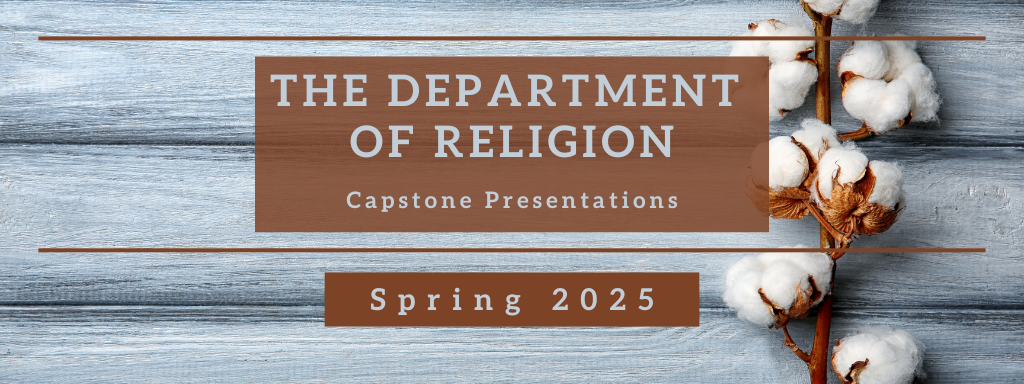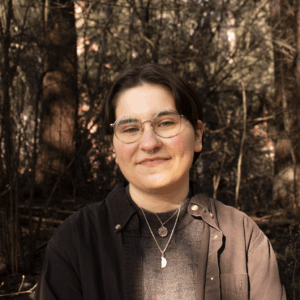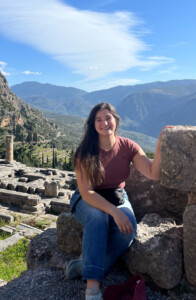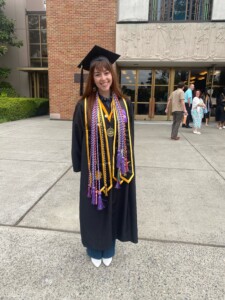
The Religion Department is pleased to present the 2025 Spring Capstones.
Wednesday, May 21 – 1:00-5:30 pm
Anderson University Center, Union Pacific Conference Room
AUC 133
1:00-2:20 pm
1:00-1:20 pm
“My Mother and I: Julian of Norwich’s Personal God”
Abstract: This paper examines the works of Julian of Norwich, a medieval mystic who wrote about visions she experienced of Christ while she was deathly ill. In the accounts of her visions, Julian imagines God as both Father and Mother. This offers a unique approach to the traditional image of Christ and allows us to imagine a different relationship between God and humanity.
Why I Majored in Religion: As someone who was raised religious, I at times had a tumultuous relationship with Christianity. Studying religion gave me a chance to examine my own experiences and beliefs in a safe and encouraging environment. Through this experience I have come to better understand the importance of religion and the cultural and sociological significance it holds in our world.

Jess Wright
1:20-1:40 pm
Seeds of Justice: Sikh Resistance Inspired by the Zafarnama
Abstract: This paper explores how the Zafarnama, an Epistle of Victory composed by the 10th Guru of Sikhi, Guru Gobind Singh Ji, influences Sikh resistance through nonviolence and steadfast unity. To further analyze the impacts of the Zafarnama on the Punjabi Sikh community, this paper uses the examples of the creation of the Khalsa Panth, Operation Blue Star in 1984, and the Farmer’s Protest of 2020. We can use these examples to examine how the Zafarnama does not promote violence, but supports resistance through forms of nonviolence and force.
Why I Majored in Religion: Because I was used to the scientific world through majoring in chemistry, I wanted to major in religion so that I could expand on my connections with different cultures and traditions. I also found that these classes challenged my knowledge of certain topics, allowing me to deepen my understanding of cultures and traditions worldwide.

Justinpal Singh
1:40-2:00 pm
Christian Delusions of Persecution in Nazi Germany
Abstract: This paper explores the reasons behind the complacency of Catholics during the Holocaust in Germany. Catholics constituted slightly over 32.5 percent of the population. While some individual Catholics may have opposed the actions of the Nazi government, the Catholic Church as an institution chose not to advocate for the marginalized and instead aligned itself with the Nazis. This paper will argue that the Catholic complacency in Nazi Germany can be attributed, in part, to a fear of persecution and the privilege of safety. To support this argument, the paper will examine key historical events, including the Kulturkampf of 1870, the Reichskonkordat of 1933, and the concept of Positive Christianity introduced in 1920.
Why I Majored in Religion: I majored in Religion because I believed it would help me understand human nature. Religion, specifically Lutheranism, shaped my entire childhood. It was my understanding of morals and connection. It was so powerful to me personally that I wanted to understand other religions. I also wanted to work for the UN’s Office of Genocide Prevention and one of their tactics is to connect with local religions leaders to deescalate the violence.

Mattie Tupper
2:00-2:20 pm
Genesis 19: When Legend Becomes “Truth”
Abstract: This paper is about Genesis 19 and its role as a story in contemporary society in the making of anti-queer laws and policies. Genesis 19 has been used to justify violence and hatred against queer people due to a misunderstanding about the sin present in the story and the intentions of the story as a whole. This paper will clear up the misunderstanding and present what the story is contextually about while noting its effects in US and Nigerian policy.
Why I Majored in Religion: I majored in Religion because the things we believe and the things we do are all influenced by Religion. It has such a strong impact on our world and if we do not understand that which we believe we cannot grow, change, and move forward into a better world.

Áine McCarty
2:20 - 2:40 pm - Break
2:40-3:00 pm
Paul’s Veiled Message of Unity to Corinth
Abstract: This paper explores how Paul’s instructions about head coverings in 1 Corinthians 11:2–16 used visual symbols like hair to promote unity and create space for women in the early church. By drawing from Jewish customs and adapting them for a primarily Gentile audience within Greco-Roman society, Paul helped lay a foundation for unity within a newly forming church body. His teaching aimed to bridge divisions across gender and socio-economic status in Corinth’s diverse population. Paul’s approach was both practical and strategic, preserving the church’s public reputation while encouraging broader participation and leadership among all believers.
Why I Majored in Religion: I chose to major in Religion because my relationship with Jesus has always been a central part of who I am. When I studied abroad in Namibia, I was inspired to see how people lived out that same kind of relationship with God in ways that were both familiar and completely different from what I had known. It opened my eyes to how faith can look different across cultures and still be equally true and powerful. I wanted to study religion more deeply because I believe these differences do not divide us — they reveal the depth and beauty of faith.

April Kelly
3:00-3:20 pm
Judith and the Weapon of Seduction
Abstract: The book of Judith narrates a story from Second Temple Judaism where a female protagonist, Judith slays an Assyrian general who is charged to destroy the Jewish people. Distinct in her nature, Judith does not follow the contemporary narrative of a “tradition religious woman” as she deceived the general by pretending to seduce him, got him drunk, and decapitated him while not breaking the Jewish covenants. This paper analyzes the book of Judith by exploring historicity, identity markers within the story, and the canonicity of the text to reframe contemporary understanding of a traditional woman.
Why I Majored in Religion: The queer female perspective is often buried in Christianity. So how do I connect to a God whose story has been written, translated and maintained by men? That I have yet to figure out. I chose to major in Religion at PLU so that I could hear and understand narratives that are harder to see in religion and history. The ability to navigate old literature and contemporary interpretations of literature allow me to navigate the influence that religion does and can have on society.

Sage Miller
3:20-3:40 pm
Finding Solace: Chantway Parallels in Videogames
Abstract: This paper explores how illness narratives provide therapeutic benefits of externalizing and separating ourselves, acknowledging, reframing, and giving voice to our suffering, This helps us overcome and begin to heal from these diseases and sorrows. The paper explores the mental health benefits of narratives, as reflected in Navajo Chantways and explored in video games.
Why I Majored in Religion: I did not grow up religious, but I quickly learned that religion shapes the world around us in innumerable ways. My hope is that by studying religion I can better understand the world around me, help others understand why people think the way they do, and explore how we can compromise and learn better ways to move forward while juggling differing opinions.

Abigail Carr
3:40-4:00 - Break
4:00-4:20 pm
Chestfeeding as a Ceremonial Practice of Indigenous Sovereignty
Abstract: This paper argues that chestfeeding is a ceremonial act of Indigenous food, body, land, and Knowledge sovereignty. Introductory anatomy and physiology are presented in tandem with the uplifting of Native historical and cultural accounts. This establishes implicative claims analyzed under American Indian Liberation Theology. The argument is then applied using Indigenous methodologies and ways of being to challenge Western political, social, cultural, medicinal, and governmental entities.
Why I Majored in Religion: I did not originally intend to study religion at Pacific Lutheran University (PLU). If anything, I wished to complete my pre-requisite courses as fast and easily as possible. Flash forward to Dr. Zbaraschuk’s rambling but vitally important teaching about the Wesleyan Quadrilateral, and I became hooked. The application of theological framework to health science and social work creates a distinct lens from which to look. This view can assist in the expansion of more equitable and culturally congruent health policies and systems.

Olivia Tate
4:20-4:40 pm
“You shall know that I am the Lord”: The Marriage Metaphor in Ezekiel 16
Abstract: My paper will explore the marriage metaphor in Ezekiel 16 through the lenses of Feminist Critique and Trauma Analysis. I argue that the reason for Ezekiel’s use of this metaphor specifically, where Jerusalem is a wife and God is her husband, is best understood by holding these lenses in conversation with one another.

Ella Brei
4:40-5:00 pm
Ensouled from Conception? The Theology of the Soul in Christian Pro-Life Thought
Abstract: This capstone looks at how Christian beliefs about the soul have shaped today’s pro-life movement. It focuses on the idea that life—and the soul—begin at conception. This is a belief rooted in early church teachings, especially from the theologian Tertullian. Even though many modern pro-life Christians may not know these origins, their views are still shaped by them. This project shows how old theological ideas continue to influence present-day beliefs and activism around abortion.




Social Media